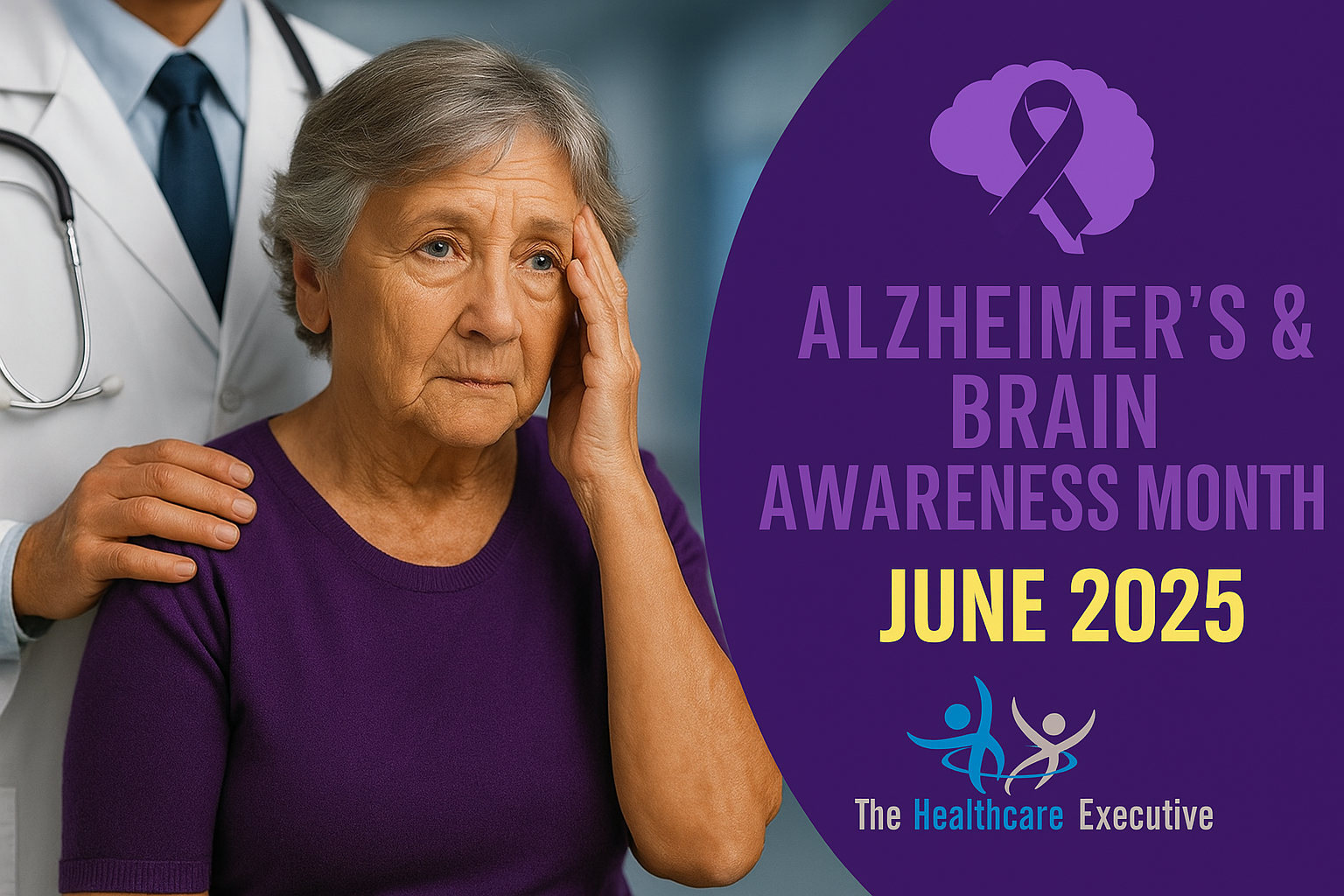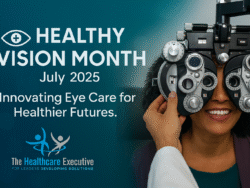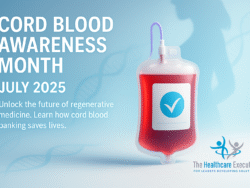Alzheimer’s & Brain Awareness Month – June 2025

- Posted by Greg Wahlstrom, MBA, HCM
- Posted in Health Observance Calendar
Hospital Leadership’s Role in Addressing Alzheimer’s Care, Research, and Equity
Published: June 1, 2025
June marks Alzheimer’s & Brain Awareness Month, a time to elevate understanding, research, and care strategies for one of the most pressing public health challenges of our time. Alzheimer’s disease is the most common form of dementia, affecting more than 6 million Americans and growing as the population ages. For hospital executives, the burden of cognitive decline demands not only compassionate clinical care, but also system-level planning across neurology, geriatrics, and social services. With healthcare systems facing a rising tide of aging patients, boards and C-suites must reevaluate long-term care models, family engagement strategies, and clinical workforce training. A 2024 report by the Alzheimer’s Association revealed that 1 in 3 seniors dies with Alzheimer’s or another form of dementia. The costs are not only financial—emotional tolls on caregivers, staff, and health systems are considerable. Early diagnosis and brain health screenings must become standard across primary and specialty care pathways. Hospital leaders must advocate for resources that support patients and caregivers through each stage of the disease. Rebuilding trust through improved communication and transparency is key to effective Alzheimer’s care. As we enter June, leaders should reflect on their organization’s capacity to meet this growing need.
Hospital executives have an opportunity to reimagine how Alzheimer’s and related dementias are addressed in both inpatient and outpatient settings. Innovative models like memory care units and neurocognitive health programs offer scalable blueprints for integrated care. At Mount Sinai Health System, multidisciplinary teams bring together neurologists, social workers, and geriatricians to create personalized patient plans. This team-based care model supports not only clinical outcomes but enhances patient dignity, safety, and comfort. In the context of value-based care, Alzheimer’s care must be viewed through a population health lens to ensure equitable access and continuity. Health systems should establish protocols to flag cognitive risk factors during hospital admissions and transitions of care. Proactive case management and long-term care planning help reduce readmissions and emergency department use. Technology-enabled memory clinics and AI-based cognitive screening tools can expand reach and efficiency. Hospital CIOs and CMOs should collaborate to integrate these tools responsibly into care delivery. Forward-thinking health systems will align strategic initiatives with growing demand for compassionate, quality Alzheimer’s services.
Brain awareness is not only about disease—it’s about protecting, promoting, and preserving cognitive function at every life stage. Hospital leaders should explore preventative health initiatives such as lifestyle medicine, nutrition, and cardiovascular management to reduce brain disease risk. The link between diabetes, heart disease, and dementia presents an opportunity for cross-specialty prevention strategies. Programs like those at Mass General Hospital use preventive neurology to address risk factors decades before symptom onset. Health education campaigns around brain health must be culturally tailored and accessible to diverse populations. Board leaders should allocate funding for public outreach, especially in underserved communities disproportionately impacted by health disparities. Hospital-based wellness initiatives that promote brain training, physical activity, and social engagement help preserve function in older adults. Dementia prevention should be part of executive strategy alongside treatment and hospice planning. As longevity increases, the need for lifetime cognitive care integration becomes critical. Hospitals must adapt their infrastructure, workforce, and digital tools to respond. Leadership today must make decisions that prepare systems for the cognitive challenges of tomorrow.
Caregivers are often the unsung heroes in Alzheimer’s care, and hospitals must position themselves as allies in their journey. Executives should establish robust caregiver support services that include counseling, education, and respite options. Providing caregivers with practical resources during and after hospitalization supports both the patient and care team. At Banner Alzheimer’s Institute, caregiver support is integrated into all treatment protocols, demonstrating how executive vision can shape meaningful care experiences. Boards should also measure caregiver satisfaction and burnout as part of quality metrics. Training clinical staff in dementia communication best practices enhances safety and reduces friction during care transitions. Hospital-sponsored workshops and online caregiver hubs can foster education and reduce isolation. Internal policies must consider the caregiver’s voice in treatment planning, discharge decisions, and home care coordination. Family-centered care is not a fringe benefit—it’s a clinical necessity. Equipping caregivers with knowledge and tools improves outcomes and reduces healthcare utilization. Hospital leaders who champion this approach model the empathy and excellence patients and families deserve.
Alzheimer’s & Brain Awareness Month is not just a campaign—it is a call to lead with intention, science, and humanity. Healthcare executives must elevate brain health as a strategic imperative embedded into the operational fabric of their institutions. That includes appointing neurology leadership to governance roles and aligning Alzheimer’s care goals with broader system KPIs. Population health departments should stratify data to identify community segments at higher risk and prioritize outreach accordingly. Mental health integration, social work collaboration, and spiritual care must all collaborate in addressing the full human impact of cognitive decline. The National Institute on Aging offers guidance and evidence-based interventions that can be adapted into health system protocols. Hospitals must be proactive, not reactive, as Alzheimer’s rates accelerate in aging populations. Boards should commit to investing in Alzheimer’s research, technology, and staff development. Visionary leaders will build infrastructure that lasts beyond June and transforms how we care for the aging mind. Every decision made at the executive level can shape outcomes for generations. This month, let those decisions be informed by compassion, urgency, and purpose.
Discover More: Explore executive insights on healthcare leadership for aging populations and how to strategically address chronic conditions across systems.
Related Posts from The Healthcare Executive
- The Healthcare Workforce Crisis: Executive Solutions That Actually Work
- Rebuilding Trust in U.S. Healthcare: A Leadership Blueprint



